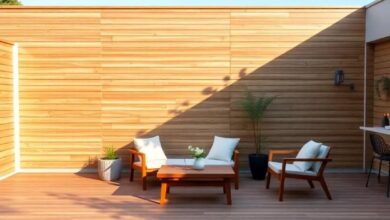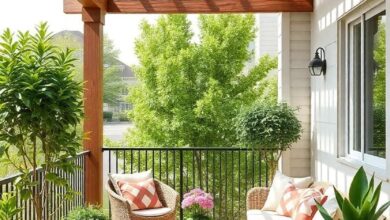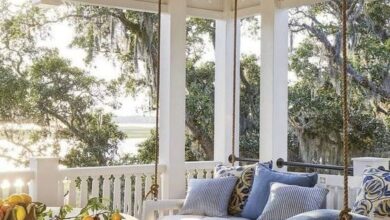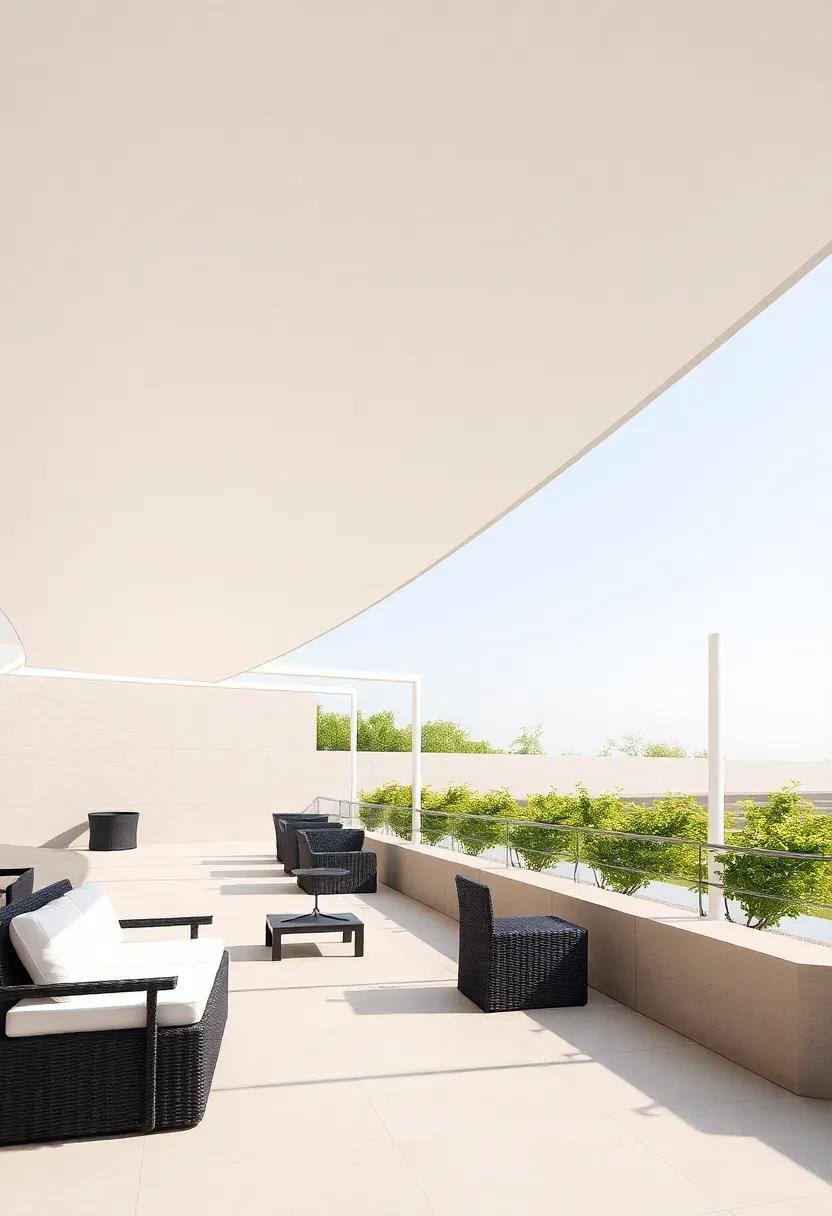
Exploring Innovative Outdoor Canopy Design: Elevate Your Outdoor Spaces
In the world of outdoor design, the canopy is more than just a protective cover; it is indeed a canvas for creativity, a bridge between nature and human ingenuity. As we seek to enhance our outdoor spaces, innovative canopy designs are emerging as transformative elements, redefining the way we experience our gardens, patios, and public parks. This article invites you to embark on a journey through the realm of outdoor canopy design, showcasing how these versatile structures can elevate both aesthetics and functionality. From sleek modern geometries to organic,nature-inspired forms,we will explore a variety of canopy concepts that seamlessly blend with their surroundings while offering shelter,ambiance,and a sense of connection to the outdoors.Whether you’re an architect, a designer, or simply an outdoor enthusiast, discover how innovative canopy design can inspire a new appreciation for the spaces we inhabit.
Exploring Sustainable Materials for Modern Canopy Structures

As the demand for eco-kind design solutions increases, sustainable materials are becoming front and center in the realm of outdoor canopy structures. Utilizing these materials not only minimizes environmental impact but also enhances the aesthetic appeal and functionality of outdoor spaces. Hear are some key sustainable materials that are paving the way for innovative canopy designs:
- Bamboo: Fast-growing and highly durable, bamboo is a versatile material that can be used for both frames and decorative elements.
- Recycled Metal: Using recycled aluminum or steel minimizes resource extraction,while providing strength and longevity to canopy structures.
- Reclaimed Wood: Incorporating reclaimed timber adds character and history, while significantly reducing the carbon footprint of new production.
- Eco-Friendly Fabrics: Fabrics made from organic cotton,hemp,or recycled polyester can enhance the visual appeal and sustainability of canopies.
In the pursuit of innovative designs, integrating these materials effectively can lead to unique architectural features and environmental benefits. To illustrate the versatility of sustainable materials, here is a brief comparison of various options:
| Material | Durability | Cost | Environmental Benefit |
|---|---|---|---|
| Bamboo | High | Moderate | Fast renewable resource |
| Recycled Metal | Very High | Variable | Reduces landfill waste |
| Reclaimed Wood | High | Variable | Reduces deforestation |
| Eco-Friendly Fabrics | Moderate to High | Moderate | Less toxic and sustainable production |
Blending Functionality with aesthetics in Canopy Design

In the realm of outdoor design, the integration of functionality and aesthetics in canopy structures has become paramount. A well-crafted canopy is not merely a shelter from the elements; it serves as a focal point that enhances the overall ambiance of outdoor spaces. Materials such as timber, metal, and composite fabrics play a crucial role in achieving this delicate balance. By carefully selecting these materials, designers can create canopies that withstand the weather while exhibiting an elegant feel. The introduction of lighting elements such as LED strips or fairy lights incorporated into the design can further elevate the atmosphere, transforming an ordinary space into an enchanting retreat, especially at night.
Moreover, innovative spatial designs offer versatile applications, making canopies functional for various outdoor activities. Elements like modular frameworks allow for customization, adapting to the needs of different events, whether a casual gathering or a formal celebration. The following table illustrates some key features that contribute to effective canopy design:
| Feature | Description |
|---|---|
| Durability | Weather-resistant materials that ensure longevity. |
| Style | Aesthetic elements that complement existing architecture. |
| Versatility | Adjustable and modular designs to suit various occasions. |
| Lighting Options | Integrating lighting to enhance mood and visibility. |
Innovative shapes and Forms: rethinking Canopy Architecture

In today’s fast-paced world, canopy architecture is undergoing a transformation that embraces the endless possibilities of design. Curvilinear shapes, irregular forms, and intricate patterns are emerging as defining characteristics, allowing outdoor canopies to become not just functional elements, but stunning visual landmarks. The result is an exquisite blend of art and utility, where soft, flowing silhouettes provide shaded retreats against harsh sunlight while seamlessly integrating into the surrounding landscape. Designers are exploring materials such as lightweight composites and innovative fabrics, pushing boundaries and allowing for canopies that can adapt, expand, and even change shape as needs evolve.
Alongside aesthetics, sustainability is at the forefront of innovative canopy architecture. Modern designs incorporate eco-friendly materials and smart technologies, such as solar panels, to harmonize with nature while minimizing environmental impact. The following aspects are frequently enough highlighted in contemporary designs:
- Modular Systems: Versatility in design that allows for future expansion or reconfiguration.
- Green Roof Options: Canopies that support plant growth, enhancing biodiversity and air quality.
- Interactive Features: Incorporation of elements such as misting systems or movable parts that respond to weather conditions.
These emerging trends not only elevate aesthetic appeal but also encourage community engagement and interaction with outdoor spaces, ultimately creating unique environments for leisure and gathering.
Creating Seamless Outdoor-Indoor Transitions with canopies

Integrating canopies into outdoor spaces can create a harmonious flow between nature and the comfort of indoor living. By strategically placing these versatile structures,you can establish inviting areas that blur the lines between the inside and outside. Consider using transparent or semi-transparent fabrics that allow light to filter through while offering protection from the elements.This design choice not only enhances the aesthetic appeal but also invites nature into your daily routine.
To maximize the potential of these transitions, take into account the placement and features of your canopy.Triumphant outdoor-indoor designs frequently enough include:
- Modular Canopy Systems: Effortlessly adaptable to various spaces.
- Framed Openings: Create defined entry points that draw the eye.
- Solar-Powered Lighting: Use ambient lighting to maintain usability after dark.
- Natural Elements: Incorporate plants and greenery to further emphasize the connection.
By implementing these concepts, you can create a seamless transition that promotes relaxation and outdoor living enjoyment. Consider having a dedicated area for gatherings, meals, or simply quite moments, where the canopy serves as the threshold between your home and the outside world.
| Feature | Benefit |
|---|---|
| Weather Resistance | Protection against harsh conditions. |
| Design Flexibility | Customizable aesthetics to fit your style. |
| Eco-Friendly Materials | Supports sustainable living practices. |
| Increased Usability | extends the outdoor season. |
Harnessing Nature’s Elements: Integrating Biophilic Design

Integrating elements from the natural world into your canopy design not only enhances aesthetic appeal but also supports overall well-being. By incorporating organic shapes,natural materials,and a palette that reflects the surrounding surroundings,your outdoor space can foster a sense of calm and connection. Consider the use of wood, stone, and water features to invoke the beauty of nature. Additionally, the strategic placement of plant life can create dynamic shadow patterns and improve air quality, transforming your outdoor area into a serene retreat.
To effectively harness nature’s elements, focus on elements that draw visitors outside and encourage interaction with their surroundings. Design features such as living walls, green roofs, and sustainable lighting solutions can enhance the experience and promote biodiversity.here are some components to consider in your outdoor canopy design:
- Green Canopies: Use climbing plants to create a living, breathing roof that dynamically changes with the seasons.
- Natural Ventilation: Incorporate wide openings that allow fresh air to flow, promoting a comfortable atmosphere.
- Water Elements: Add reflective pools or flowing water features that provide calming soundscapes.
| Element | Benefits |
|---|---|
| Wood Accents | Warmth and a natural look |
| Stone Pathways | Durability and visual interest |
| Reflective Materials | Enhanced lighting and openness |
Color Schemes That Transform Outdoor Ambiances with Canopies

Color plays a pivotal role in setting the mood of any outdoor space, and canopies offer a unique opportunity to experiment with vibrant hues and subtle palettes alike.By choosing the right color scheme, you can effortlessly create an array of atmospheres. Consider pairing bold and bright colors with natural surroundings to add a lively touch, or opt for muted tones that harmonize with the earth to establish a tranquil retreat.Some combinations to explore include:
- Sunny Yellow and Aqua: Brings a cheerful vibe.
- Cool Gray and Forest Green: Creates serenity and balance.
- Rich Burgundy and Cream: Introduces elegance and warmth.
Additionally, you can take your design a step further by integrating patterns and textures within your color schemes.A striped canopy can add dimension, while floral prints can evoke a whimsical garden feel.Consider the seasonal elements as well when selecting your colors—spring pastels, summer brights, autumn earth tones, and winter whites each tell their own story. Here’s a fast reference table for suggested color pairings and their corresponding vibes:
| Color Scheme | Vibe |
|---|---|
| Turquoise & Coral | Energetic & Fun |
| Slate Blue & Sand | Calm & Relaxing |
| Charcoal & Blush | Modern & Chic |
| Citrus Greens & Beige | Fresh & Inviting |
Innovative Retractable Canopies for Versatile Spaces
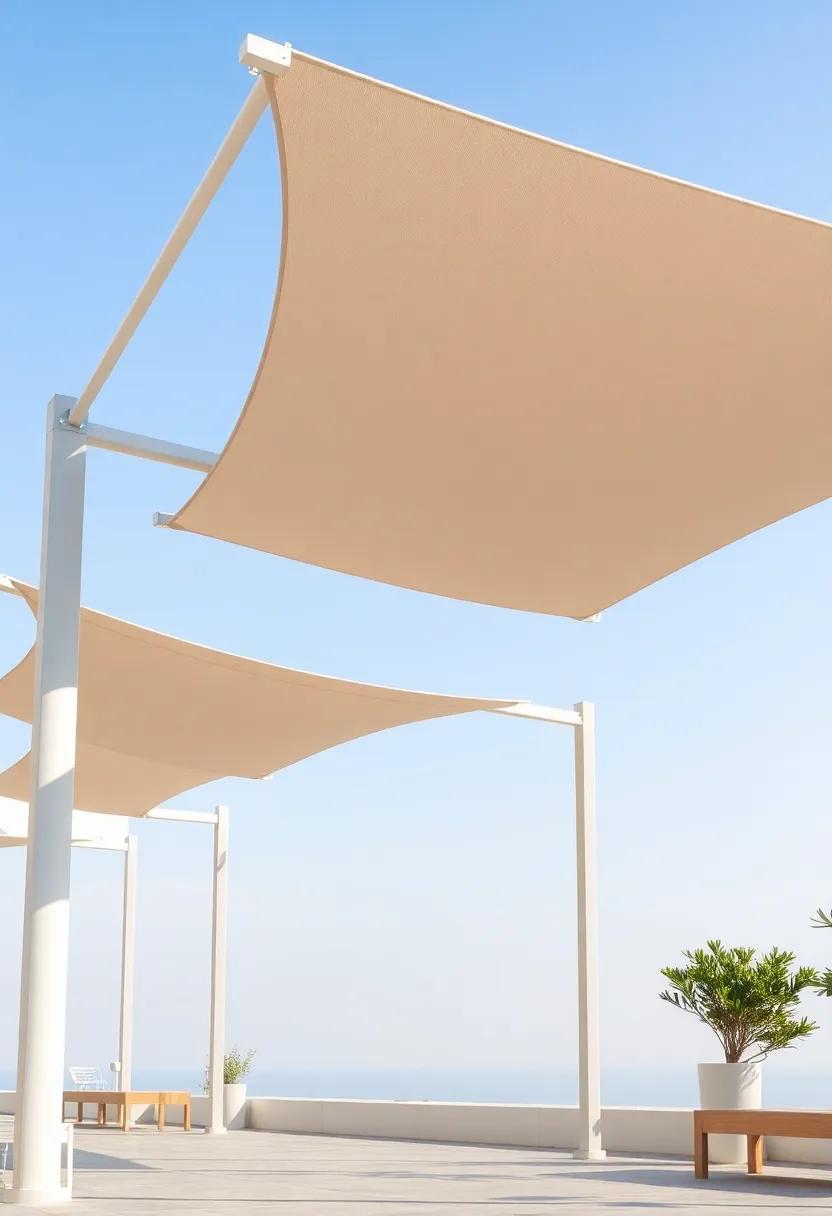
Retractable canopies are revolutionizing the way we think about outdoor spaces,providing both functionality and aesthetic appeal to any environment. With their ability to adapt to changing weather conditions and user preferences, these innovative structures offer a unique blend of style and practicality. Imagine hosting a barbecue on a sunny day, only to have the option of a cozy shaded retreat at the push of a button or a leisurely evening under the stars without intrusive elements. The versatility of retractable canopies enhances outdoor living, creating spaces that can be easily transformed from a sun-drenched gathering area to a comfortably shaded oasis.
These canopies come equipped with cutting-edge technology and customizable designs to cater to various needs. Key features that define modern retractable canopies include:
- Smart Controls: Integrating automation for effortless opening and closing.
- Durable Materials: Engineered for weather resistance and long-lasting beauty.
- Design Customization: Available in various colors and patterns to match your decor.
to illustrate the benefits, consider this simple comparison:
| Feature | Retractable Canopy | Traditional Awning |
|---|---|---|
| Versatility | High | low |
| Aesthetics | Customizable | Fixed Design |
| Ease of Use | Automated | Manual |
Innovative Lighting Solutions to Enhance Canopy Experiences

As outdoor canopy designs evolve, integrating innovative lighting solutions is crucial for enhancing the overall ambiance and functionality of these spaces. LED string lights and solar-powered lanterns can effortlessly illuminate your canopy,creating a warm and inviting atmosphere. Consider using color-changing LED fixtures that adapt to the mood or event theme, allowing for seamless transitions from intimate gatherings to vibrant celebrations. Furthermore, incorporating motion sensors can enhance safety and energy efficiency, ensuring lights are only activated when needed.
Beyond traditional lighting options,utilizing bioluminescent materials can offer a unique touch to your canopy experience. These materials not only provide subtle illumination but also add an enchanting element to your space.To effectively plan your lighting strategy, consider the following factors:
- Brightness Levels: Tailor to the activity and atmosphere
- Installation Flexibility: Easy to set up and rearrange
- Energy Efficiency: opt for sustainable solutions
- Weather Resistance: Ensure durability for outdoor conditions
| Lighting Type | Features | Best For |
|---|---|---|
| LED String Lights | Versatile, available in various colors | Casual gatherings |
| Solar-Powered Lanterns | Eco-friendly, requires no wiring | Eco-conscious events |
| Color-Changing LEDs | Customizable colors, remote control | Themed parties |
| Bioluminescent Materials | Unique glow, minimal light pollution | Nature-inspired settings |
Seasonal Adaptability in Canopy Designs for year-Round Use

Designing outdoor canopies that gracefully transition between the seasons requires ingenuity and a keen understanding of natural elements. To achieve this, savvy designers often incorporate multifunctional features that enhance usability while maintaining aesthetic appeal. For instance, adjustable side panels can offer shade in the sweltering summer months, while insulation options or heated lighting can create a cozy atmosphere during chilly winter evenings. Additionally, integrating materials that withstand harsh weather conditions ensures that the canopy remains both durable and visually inviting year-round.
Consider the following innovative elements that enhance seasonal adaptability in canopy designs:
- Retractable Roof Systems: Offers flexibility for sun exposure or protection from rain.
- Seasonal Fabrics: Use of UV-resistant fabrics in summer and insulated materials in winter.
- Integrated Gutters: Ensure effective water drainage, preventing damage in wet seasons.
- Natural Ventilation: Incorporating airflow systems to keep spaces cool during warm months.
| Season | Canopy Feature | Benefit |
|---|---|---|
| Spring | Lightweight Fabrics | Easy installation and removal |
| Summer | Shade Panels | Protects from harmful UV rays |
| Autumn | Windbreaks | blocks cold drafts while maintaining views |
| Winter | Insulated Liners | Keeps space warm and inviting |
Safe and Stylish: Incorporating Safety Features in Canopies

When designing outdoor canopies, it’s crucial to combine aesthetics with functionality, ensuring not just a stylish appearance but also a focus on safety. Modern canopies can be equipped with high-quality materials that resist harsh weather conditions, including UV rays and strong winds. Incorporating features such as reinforced seams, sturdy frames, and water-resistant fabrics not only enhances durability but also adds a layer of safety for users. To further elevate the design, consider the following safety elements:
- Weighted Bases: Ensures stability against unexpected gusts.
- Edge Guarding: Soft edges and protective designs to prevent accidents.
- Reflective Strips: Enhances visibility in low light, making it safer for evening gatherings.
It’s also essential to think about the user’s comfort and accessibility while crafting these outdoor spaces. Canopies with adjustable heights allow for better air circulation and comfort, promoting safety during diverse weather conditions. To assess the effectiveness of various features, a quick comparison can be made:
| Feature | Benefits |
|---|---|
| Wind-Resistant design | Prevents damage and enhances stability. |
| Fire-Resistant Materials | Increases safety during outdoor cooking or gatherings. |
| Smart Anchoring Systems | Easy setup with secure placement options. |
Crafting intimate Spaces: Cozy Canopies for Social Gatherings

Transform your social gatherings into memorable experiences with the addition of cozy canopies that ooze warmth and intimacy. By creating pockets of shelter adorned with soft textiles and ambient lighting, you can invite your guests into a world where comfort reigns supreme. Consider using the following elements to enhance the atmosphere:
- Layered Fabrics: Drape sheer curtains or blankets; they create an enchanting feel while allowing gentle breezes to flow through.
- Ambient lighting: String lights or lanterns suspended from the canopy can transform the evening, casting a warm, inviting glow.
- Comfortable Seating: Incorporate plush cushions and throws that encourage lounging and connection among your guests.
To take your canopy design a step further, think about how to engage all the senses. Introduce subtle scents through candles or essential oil diffusers, and consider the sounds of soft music or nature to enrich the experience. A well-thought-out layout can make all the difference, so organizing seating in a circular configuration can foster conversation and camaraderie:
| Canopy Feature | Purpose |
|---|---|
| comfortable Seating | Encourages relaxation and conversation |
| Soft Lighting | Creates a warm and inviting atmosphere |
| textured fabrics | Enhances visual interest and comfort |
The Role of Canopies in Climate Adaptation Strategies

Canopies serve as a vital buffer between the harsh elements and our beloved outdoor spaces, making them an essential component of climate adaptation strategies. By providing shade, they can significantly reduce heat buildup in both urban and rural areas, alleviating the urban heat island effect. Moreover, canopies enhance biodiversity by creating microhabitats and promoting the growth of various plant species, which in turn enhances local ecosystems. Their ability to manage stormwater through interception and absorption further illustrates how well-designed canopies can mitigate flooding and reduce erosion in vulnerable landscapes.
Innovative canopy designs also offer opportunities for community engagement and environmental education. They can be utilized in public parks, schools, and community gardens, serving both functional and aesthetic purposes. here are some key benefits of incorporating canopies into climate adaptation strategies:
- Temperature Regulation: Reduces reliance on air conditioning and energy consumption.
- Pollinator Friendly: Attracts essential pollinators, supporting local agriculture.
- Enhanced Outdoor Comfort: Creates pleasant spaces for social interaction and recreation.
- Water Conservation: Lowers irrigation needs through strategic shading of plants.
To further evaluate the impact of canopies in design projects,consider the following table,which highlights different types of canopies and their specific adaptation benefits:
| Canopy Type | Benefits |
|---|---|
| Shade Canopies | Reduce surface temperatures and increase comfort for users. |
| Green Roof Canopies | Support biodiversity and improve air quality. |
| Retractable Canopies | Provide flexibility for varying weather conditions. |
| Solar Canopies | Generate renewable energy while providing shelter. |
Exploring Cultural Influences in Canopy Design Around the World

Canopy designs around the world reflect a rich tapestry of cultural influences, shaping how outdoor spaces are perceived and utilized. In many cultures, canopies serve not only as practical structures providing shade and shelter but also as symbols of social gatherings and communal identity. For instance, traditional Japanese noren curtains, often found flanking entryways, blur the line between indoor and outdoor spaces, embodying a spirit of hospitality and welcoming. In contrast,the vibrant,intricate designs of Indian chaats canopies,adorned with colorful fabrics and ornate details,serve as a celebration of culture and festivity,enhancing street markets and outdoor events.
Modern canopy designs have also drawn inspiration from various cultural aesthetics, merging functionality with artistry. The use of sustainable materials and innovative construction techniques allows designers to stay true to cultural roots while adapting to contemporary needs. Notable examples include:
- Middle Eastern tents that utilize lightweight, airy fabrics to create open, adaptable spaces for social events.
- Scandinavian minimalist canopies that favor simplicity and nature-inspired forms, enhancing tranquility in urban parks.
- South American cabanas that utilize local timber and vibrant textiles, reflecting cultural heritage and ecological awareness.
This blend of tradition and modernity ensures that outdoor canopies not only serve a utilitarian purpose but also foster a sense of place and identity,encouraging communities to engage with their surroundings in meaningful ways.
Maximizing Shade and Sunlight with Intelligent Canopy Planning

In the world of outdoor design, effective canopy planning can transform how we experience our exterior spaces. By carefully considering the interplay of shade and sunlight, one can create areas that are not only visually stunning but also functional for various activities.Key strategies include:
- Orientation: Determine the natural path of the sun throughout different seasons to position canopies for optimal coverage.
- Layering: Utilize multiple layers of canopies, varying heights and materials, to create dynamic light patterns and diverse shaded zones.
- Material Selection: Choose fabrics and surfaces that reflect or absorb sunlight effectively based on the intended use of the space.
To achieve the perfect balance of light and shade, one can also consider integrating smart technologies that respond in real-time to environmental conditions. For example, automatic canopies can extend or retract based on the time of day or current weather, providing flexible comfort. By analyzing factors such as:
| Factor | impact on canopy Design |
|---|---|
| Sun Position | Adjusts shade areas during peak hours. |
| Wind Direction | Enhances stability and comfort in breezy environments. |
| Temperature Variations | Influences material choice to maintain a comfortable atmosphere. |
Innovative Fabrics That Challenge Conventional Canopy Materials

As outdoor living spaces evolve, so too dose the need for materials that not only withstand the elements but also enhance the aesthetic appeal of our environments. Enter a new wave of fabrics that defy traditional canopy norms. These pioneering textiles are engineered to offer a blend of sustainability, durability, and style. From recycled PET to advanced UV-resistant meshes, these fabrics boast unique properties that cater to the demands of outdoor use while minimizing their environmental impact. Features include:
- Waterproof and Breathable: Innovative textiles provide the dual benefit of keeping the rain out while allowing moisture vapor to escape, preventing condensation.
- Fade and Mildew Resistance: Advanced chemical treatments ensure vibrancy even after prolonged exposure to UV rays and moisture.
- Lightweight yet Sturdy: Materials designed for maximum strength without the burden of excess weight facilitate easy installation and movement.
Additionally, cutting-edge designs merge function with aesthetics. Textiles are now available in a myriad of colors and patterns, giving homeowners the ability to tailor their canopies to their personal style. Thanks to advancements in fabric technology, we can now enjoy canopies that not only provide shelter but also serve as striking focal points in outdoor settings. Consider these trendy options:
| Fabric Type | Benefits |
|---|---|
| Solar Fabrics | Energy-efficient and protective against UV rays. |
| Eco-friendly Canopies | Made from recycled materials, promoting sustainability. |
| Water-repellent Textiles | Exceptional water resistance while remaining breathable. |
The Future of Canopy Design: Smart Technology Integrations

As we delve into the realm of outdoor canopy design, the integration of smart technology is becoming a game-changer. Imagine a canopy that responds to weather changes, enhancing your comfort and convenience. These innovative structures can be outfitted with sensors that detect rain, wind, and temperature, automatically adjusting their settings to provide optimal shelter and climate control. With smart technology, you can enjoy:
- Automated shading: Sensors that open or close canopies based on sunlight levels.
- Voice control: Integration with smart home systems for effortless adjustments.
- Energy efficiency: Dynamic responses that optimize cooling and heating.
Moreover, the ability to monitor usage patterns and environmental conditions can lead to more sustainable outdoor spaces. By collecting data, smart canopies can help in making informed decisions about maintenance and energy consumption. Consider deploying a canopy that not only enhances aesthetics but also promotes eco-friendly practices. below is a comparison of traditional canopies versus smart canopies:
| Feature | Traditional Canopy | Smart Canopy |
|---|---|---|
| Manual Control | Yes | No |
| Weather Response | No | Yes |
| Energy Efficiency | Low | high |
| Integration with Smart Home | No | yes |
Elevating Public Spaces with Large-Scale Canopy Installations

Large-scale canopy installations are revolutionizing the way we perceive and utilize public spaces. These structures not only provide shade and shelter, enhancing comfort during outdoor activities, but they also serve as stunning artistic landmarks that transform the visual landscape. By incorporating elements such as lightweight materials and innovative designs, architects and urban planners can create dynamic environments that foster social interaction and community engagement.The versatility of canopy structures allows them to adapt to various settings, from urban parks and plazas to festival grounds and markets.
moreover, well-designed canopies can significantly improve the functionality of outdoor spaces by offering designated areas for events, recreation, and relaxation. By integrating features such as seating arrangements, lighting, and interactive elements, these installations can become focal points for community gatherings. Consider the following key benefits:
- Enhanced Accessibility: easily navigate and occupy outdoor spaces, making them welcoming and inclusive.
- Environmental Impact: Increased greenery and biodiversity can be promoted through canopy-covered areas.
- Year-Round Usability: Weather-resistant canopies extend the usability of public areas throughout different seasons.
To illustrate the profound impact of canopies on urban spaces, the following table highlights successful projects around the world:
| Project Name | Location | Year Completed | Notable Features |
|---|---|---|---|
| The Hive | Melbourne, Australia | 2021 | Interactive light installations and sustainable materials. |
| Urban Oasis | Singapore | 2019 | Multi-layered green spaces and community gardens. |
| Peace Park Canopy | London, UK | 2022 | Cultural events and performance spaces incorporated. |
Exploring Canopy Designs That Foster Community Engagement

Canopies can play a pivotal role in enhancing community interaction by serving as multifunctional spaces that invite gathering and engagement.Thoughtfully designed canopies can create a welcoming environment that encourages socialization, learning, and creativity.By incorporating features such as seating areas, art installations, and interactive elements, these spaces can embody the spirit of the community while providing a functional outdoor retreat. Vibrant colors and local artistic influences can further enrich the canopy, making it not just a shelter but a cultural landmark that resonates with the values and identity of the neighborhood.
To foster more vibrant interactions, the design of these canopies should prioritize flexibility and inclusivity. Elements such as movable furniture, adaptable lighting, and technology-friendly installations can facilitate a variety of activities ranging from outdoor classes to community events. The incorporation of sustainable materials and native plants can enhance the overall aesthetic while promoting environmental obligation. Here are some design concepts to consider:
- Flexible Seating Arrangements: Incorporate varied seating options that can be easily rearranged.
- Interactive Features: Add games or displays that invite participation.
- Seasonal Adaptability: Design for seasonal use, allowing modifications for different weather conditions.
| Feature | Description |
|---|---|
| Central Gathering Space | Clearly defined areas that encourage grouping and socializing. |
| artistic Design Elements | Murals or installations that reflect local culture or stories. |
| Natural Elements | The landscaped gardens or greenery that enhance relaxation. |
Enhancing Aesthetics with Artistic Canopy Installations

Transforming outdoor spaces through artistic canopy installations can create an inviting atmosphere that harmonizes with nature while serving practical purposes. These installations can offer shade, weather protection, and enhanced aesthetics, allowing for multi-functional spaces that appeal to both residents and visitors. By incorporating various styles, colors, and materials, you can customize each canopy to reflect the personality of the area. Imagine a vibrant splash of color overhead,or an elegant,flowing fabric that dances in the breeze,drawing the eye upward and enhancing the visual complexity of the space.
When it comes to selecting the right design elements, consider the following features for your artistic canopies:
- Materials: Lightweight fabrics, sustainable woods, and metals can create a unique character.
- Shapes: curved, geometric, or asymmetrical forms can add depth and intrigue.
- lighting: Integrating ambient lighting can transform the canopy experience at night.
To help explore options, a well-structured design plan can clarify your choices:
| Feature | Option 1 | Option 2 |
|---|---|---|
| Material | Canvas | Polyester |
| Style | Traditional | Modern |
| Color | Earth Tones | Bright Colors |
artistic canopy designs not only enhance the aesthetics of your outdoor space but also contribute to its functionality, making it a versatile area for relaxation, gatherings, or events. These installations can effectively define areas, create visual interest, and cultivate a distinct charm that complements the surrounding environment.
The Conclusion
As we conclude our exploration of innovative outdoor canopy design, it’s clear that these structures offer much more than mere shade. They represent a harmonious blend of functionality and artistry,transforming outdoor spaces into inviting retreats that celebrate nature while providing comfort and protection. As you consider the possibilities for your own outdoor environments, remember that the right canopy can enhance not only the aesthetic appeal but also the practical use of your spaces. Whether you opt for a sleek modern style or a whimsical, nature-inspired design, the right canopy has the potential to elevate your outdoor experience, inviting relaxation, creativity, and connection with the elements. So go forth,envision your ideal outdoor oasis,and let the transformative power of innovative canopy design reimagine your relationship with the great outdoors.
As an Amazon Associate I earn from qualifying purchases.
